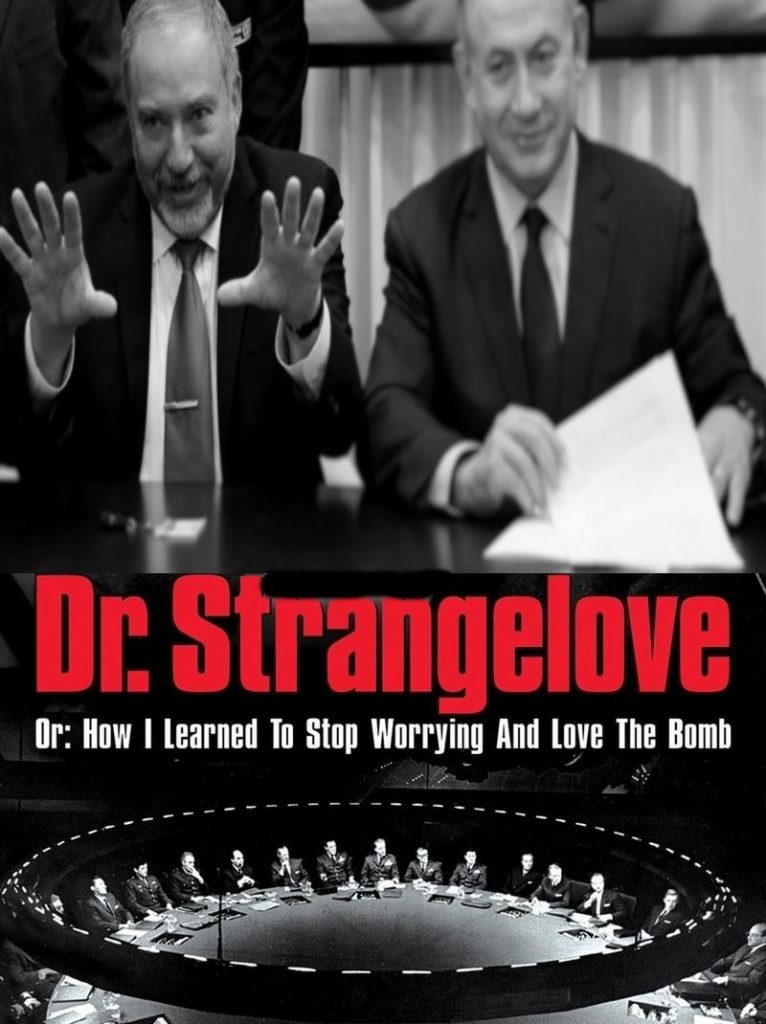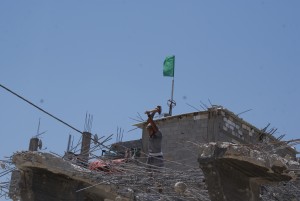Lieberman, Netanyahu and Dr Strangelove
The appointment of Avigdor Lieberman as Israel's defence minister is like the plot of a nihlistic black comedy.

Thursday 9 June 2016
To Arabs, the appointment of Avigdor Lieberman as Israel's defence minister sounds like it could be the plotline of a 21st-century Israeli adaptation of Stanley Kubrick's 1960s classic, Dr Strangelove, but without the laughs.
After all, this is a politician who has casually suggested, on a number of occasions, that Israel should bomb the Aswan High Dam, reportedly for what he perceived as Egypt's support of Yasser Arafat and the, at the time, hypothetical redeployment of Egyptian troops to the demilitarized Sinai.
If I were someone who took the statements of politicians at face value, then this threat would terrify me. If by bombing, Lieberman meant the destruction of the dam, then that would likely lead to the certain death of millions of my compatriots, including family and friends, who would be swept away in a huge tsunami-like tidal wave.
Even though such destruction is impossible short of multiple nuclear strikes, engineers say, this has become Lieberman's most famous and infamous outburst in Egypt, given its genocidal implications, with most articles in the Egyptian media about his new position mentioning it.
Another Egyptian media fixation is on Lieberman's brief “career” as a nightclub bouncer, suggesting that Moldovan immigrant is some kind of brainless thug. While certainly thuggish, he is highly intelligent and shrewd. After all, his stint as a bouncer was while he was a student at the Hebrew University and he guarded the doors of a student club.
Lieberman, whose writer father imbued him with a love of Russian literature, once reportedly dreamed of becoming a poet. And like numerous frustrated artists before him who turned to extremist politics, one can only wonder how much better things would have been for Lieberman and the world had he made it as a writer.
Of course, few Egyptians have taken seriously Lieberman's threat to undam the forces of annihilation on their country. However, the fact that Lieberman's past statements are coming back to haunt him reflect that words are not just empty sounds that travel no further than the echo chamber of Yisrael Beiteinu supporters.
His bomb-laden bombast is, nevertheless, more than simple bluster, it reflects a deeper malaise: Lieberman's ideological and instinctive hatred of Arabs in general and Palestinians in particular. This is reflected in his consistently hawkish stance, which seems, for instance, to have tipped the balance towards outright war in Gaza in 2014, through Lieberman's rivalry with Netanyahu and his constant mockery of the prime minister as a weakling unwilling to use sufficient force.
And it is this radical streak which troubles Egyptian and Arab commentators the most. Lieberman has, over the years, demanded that Israel go to war not only with Gaza, but also to exercise extreme violence against the Palestinian Authority, Hamas and Palestinian prisoners. He has also advocated the transfer of Palestinian citizens of Israel and their towns to a future Palestinian state, demanded professions of “loyalty” from Arabs in Israel and suggested that those who are “disloyal” should be beheaded.
This has raised fears among many Arab observers that Lieberman will exploit his defence portfolio to advance a belligerent, militaristic approach that will pull Netanyahu's already extremist government to the outermost reaches of the far-right.
Some analysts are convinced that by handing over Israel's army to Lieberman, Binyamin Netanyahu is deftly torpedoing the latest Arab peace overtures, this time coming from Egypt, not to mention international efforts, namely from France, without putting himself directly in the firing line.
Just days before the announcement was first made, Egypt's president Abdel-Fattah al-Sisi extended a hand to Israel, promising a “warmer peace” if Israel would only “resolve the issue of our Palestinian brothers”.
This led some commentators to view the apparently unhinged choice of Lieberman for the defence portfolio as a move intended to humiliate Sisi and the Arab League. “[Israel] is sticking its tongue out to all the Arabs,” Hassan Nafie, an Egyptian professor of political science, was quoted as saying. “Israel sees peace initiatives as coming from a position of weakness and surrender.”
However, for many Arabs, and especially Palestinians, Lieberman is simply a case of “business as usual”. “They are all Lieberman,” wrote Palestinian journalist Awni Sadiq in reference to Netanyahu and his far-right coalition.
Some see any change of personnel as irrelevant because Netanyahu, the nearest Israel has come to a dictator and whose endless tenure reflects the wisdom of term limits imposed elsewhere in the world, ultimately calls the shots. “At the end of the day, it is Netanyahu who decides more than anyone what is Israel's policy in war and in peace,” wrote Ashraf al-Arjami in the Palestinian daily al-Ayyam.
While I comprehend the depths of Palestinian disillusionment at settlement expansion, movement restrictions and the long series of extremist governments from which this attitude emanates, I can't help feeling that it is misguided. Although it is possible that it will be business as usual and, charged with actual security authority, Lieberman will learn to temper his ultra-extremism, but we must not underestimate his potential to cause enormous damage.
With the defence ministry at his mercy, Lieberman may well exert every effort to neutralise the Israeli army's newfound role as pragmatic moderator and conscience to a civilian leadership that has lost its grasp of reality and now occupies a (self-)destructive bubble.
This is reflected in Lieberman's bill to reintroduce the death penalty for Palestinians convicted on terrorism charges, while his open support of a soldier caught on film murdering in cold blood an incapacitated stabber in Hebron suggests that the practice of extra-judicial execution of Palestinian attackers is likely to escalate under his watch.
As we approach the second anniversary of the last Gaza war, and as tensions between Israel and Hamas rise, another war could be in the making. And, sadly, with Lieberman at the helm, the devastation and bloodletting of the next bout could potentially make the 2014 war seem like a minor skirmish.
____
Follow Khaled Diab on Twitter.
This article which first appeared in Haaretz on 2 June 2016.


